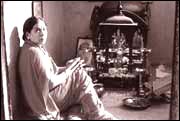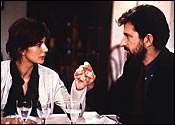
|
Cinema, the medium of change
Marathi films vie with French new wave cinema at the MAMI
|
Deepa Gumaste
To me, cinema is not just an art, it is a medium of change," says social worker-turned-filmmaker Sumitra Bhave whose Marathi film Vastupurush received warm response from the audience at the ongoing International Film Festival of Mumbai.
Bhave, who has co-directed the film with her former student and working partner Sunil Sukhtankar, only veered towards cinema as a medium to communicate with illiterate women. Her first documentary Bai, which was based on the case study of a Dalit slumdweller, won the President's Silver Medal in 1985. Which explains why the female characters in her films are far stronger than the men.
Vastupurush, for example, is the story of one illiterate woman's determination to ensure that her son breaks away from the degenerate feudal background of his once affluent family and becomes a doctor to help cure the needy.
The story is narrated through the eyes of an aged Dr Bhaskar Deshpande who has won the Magsaysay Award for his humanitarian work in Mumbai's slums. He visits his village after 40 long years and as he walks through the ruins of his old home, the events that led to his remarkable journey to a medical college in Mumbai play back in his memory.
Says Sukhtankar, "Much of the story has come from Sumitratai's personal experiences. Her grandparents were from a village near Kolhapur [in Maharastra] and she has seen the rich Brahmins of their generation losing their ancestral land but continuing to live in a feudal trap."
Bhaskar's (Siddharth Daftardar) father (Sadashiv Amrapurkar) is a veteran freedom fighter who cannot adapt to the corrupt systems that are falling into place in post-independent India. His elder brother (Atul Kulkarni) is a weakling poet incapable of fending for himself, while his uncle (Ravindra Mankani) is still hoping to find the hidden treasure he thinks his forefathers must have left behind!
 It is only Bhaskar's mother (Uttara Baokar) who believes that the Vastupurush (guardian spirit of the house) has watched over all the good and bad deeds of their ancestors and hence the family can only come upon better times if this spirit is appeased. Hence her stubborn determination to make Bhaskar a doctor and have him serve the poor.
It is only Bhaskar's mother (Uttara Baokar) who believes that the Vastupurush (guardian spirit of the house) has watched over all the good and bad deeds of their ancestors and hence the family can only come upon better times if this spirit is appeased. Hence her stubborn determination to make Bhaskar a doctor and have him serve the poor.
"I have never had to make a deliberate attempt to make my women characters formidable," says Bhave. "There are many such gritty women all over India. It's just that we have been fed certain stereotypes through our films down the years," she says.
However, for filmmakers like Bhave and Sukhtankar who are determined to destroy regressive social norms, making films is easier said than done. "Producers, particularly in Marathi cinema, are not willing to spend their money on creative effort," laments Bhave. Nor is there any distribution facility for Marathi films. Even their award-winning film Doghi failed to get a theatrical release in Mumbai.
But that hasn't prompted the duo to give up. In fact, they have released their new film 10th F in Pune and it is running to packed houses. "Hopefully, Vastupurush will make it to the theatres sometime soon," says Sukhtankar with a smile on his face.
Italian filmmaker Nanni Moretti acts in and directs The Son's Room, an outstanding film about coping with pain. What makes Moretti's film remarkable is the fluency with which all its elements blend together to make it a moving cinematic experience; whether it is the tranquil setting, the soulful background score, the unobtrusive camerawork or the honest performances.
Dr Giovanni Sermonetti (Moretti) is a psychoanalyst whose contented life falls apart when his only son Andrea dies in an accident. The once-perfect family gets torn apart as father, mother and sister go their respective ways to try and overcome this tragedy.
 The Son's Room possesses an extraordinary ability to tug at your heartstrings without slipping into mush. Two other films have dealt with the subject of a couple trying to come to terms with their son's sudden death. One was Mahesh Bhatt's Saaransh with its characteristic melodramatic approach. The other was the more recent American film, In The Bedroom, which took a bizarre turn and ended on a terribly depressing note. The Son's Room is decidedly better than both these.
The Son's Room possesses an extraordinary ability to tug at your heartstrings without slipping into mush. Two other films have dealt with the subject of a couple trying to come to terms with their son's sudden death. One was Mahesh Bhatt's Saaransh with its characteristic melodramatic approach. The other was the more recent American film, In The Bedroom, which took a bizarre turn and ended on a terribly depressing note. The Son's Room is decidedly better than both these.
Another film about despair is Bitter Reunion, Handsome Serge from the Cahiers Du Cinema package from France. Directed by film critic Claude Chabrol, this 1959 B&W marked the beginning of New Wave cinema in France. Prior to the release of Bitter Reunion, Chabrol was best known for co-authoring a book about Alfred Hitchcock and was deeply influenced by the legendary filmmaker.
But while the director seems to have drawn his naturalistic approach to characterisation, dialogues and setting from him, this film has more social comment than suspense.
Francois (Jean-Claude Brialy) comes back to his native village to convalesce and finds that much has changed during the ten years he has been away. His childhood friend Serge (Gerard Blain) has surrendered himself to alcohol after his wife Yvonne (Michel Meritz) delivered a stillborn baby. Despite Serge's determination to keep his Parisian friend at bay, Francois decides to try and get him back from the brink.
Bitter Reunion gives us a poignant glimpse into life in provincial France. Apparently, this film was shot in the same village where Chabrol spent much of his childhood, which explains why the director explores this small speck on the world map with so much feeling.